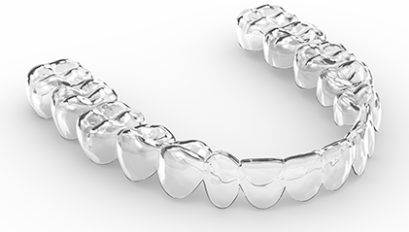Restoring your teeth not only improves the overall appearance of your smile, but protects them from wear, damage, decay and disease. Seeking to restore your teeth at the earliest opportunity will reduce your chances of needing more serious restorative treatment in the future.
Enquire Now

“I attended the surgery and was seen on time. My dentist, Dhrumil Patel, welcomed me and immediately puts you at...” ease. After my check up, I asked a number of questions, which he answered and explained in such a way, that you can't fail to understand. He also shows images, so its a visual thing as well. He takes his time, which makes you feel its not a production line. All in all, a very pleasant dental experience.”

“Incredible experience start to finish! Dr Jatan was amazing, not pushy at all and was extremely knowledgeable and kind. Invisalign...” treatment went perfectly, whitening too. Can't recommend enough.”

“Excellent! I would never have dreamed of giving a dentist such a comment! But it is true! Highly recommended.”

“Had my hygienist appointment with Mayurahea and was super informative throughout, he was also very gentle during the treatment. I...” attended with my little one who is 20months and Lidia was super with my little one and gave her cuddles whilst I was having my treatment.”

“Good serviceStaff and dentist, polite and courteous, and professional at all times.Would recommend”

“My first appointment at this practice. I am very anxious attending for dental work but I was quickly put at...” ease. As I was having an extraction done I knew it was likely to be a bit uncomfortable but it was no where near as bad as I anticipated.The dentist explained what he was doing all the time and was very calm and reassuring. The tooth was extracted a lot easier than I was expecting. I have decided to stay with this practice and have some restorative work done in due course. Thank you.”

“Crossways Dental at Coulsdon is a friendly and efficient surgery, and the treatment is always up to expectations - professional,...” careful and complete.Overall the experience inspires confidence.”

“I m having implant work done, happy with how the treatment is progressing very friendly and efficient practice.This is the...” second time I have had implant work carried out at this practice, I was pleased with the first treatment in 2021.I am happy with the work of Dr Shane Patel.”

“I come to see the hygienist regularly and she is always very thoroughly masked up to protect us both which...” is a nice and considerate touch. As far as my teeth are concerned, she always gives them a thorough clean and has helped me with some much appreciated tips with sensitive teeth. I had a pain free experience which is always nice. Thank you 😁”

“Great service.The receptionist greeted with a smile .The service from the hyginest was also professional.I would recommend to friends and...” families. .”

“Timely and thorough examination and clean carried out. The dental practitioner discussed any concerns that I had and no further...” action was required. Next check-up in 6 months time. Overall my expectations were more than satisfied.”

“Booked my appointment online and I was made to feel comfortable at my appointment as I have a fear of...” dentists. I have a treatment plan set up which is clear and I can understand my treatment and when it will be and there are no surprises.Also you pay as you go so you don’t get one large bill at the end. The staff are friendly.It was a good experience as I really don’t like going to the dentist.”

“Made an emergency appointment at the start of the year for a toothache and received great service from Dr Vanesha....” She was really friendly and gentle and was able to treat me. I love the online booking system because without it I may have not been able to get in as soon as I did. My elderly father also goes to the practice and Dr Dhrumil is absolutely brilliant with him. A really great, friendly, and professional practice that I would most definitely recommend.”

“Efficient and friendly receptionist. Dentist, Jamie, was professional and personable. Explained everything clearly and without unneccesary jargon. He...” inspired confidence.”

“Seen on time by Dhru, who is very polite, professional and informative. He puts you at ease with his lovely...” manner. His assistant was lovely too. As good an experience as going to the dentist can be. Would happily recommend to family and friends!”

“My family have been patients at the surgery for several years and we are really happy with the care they...” provide. All of the staff are friendly, supportive and helpful and they always give excellent follow up advice.”

“Dhru knows me well and pays attention to detail. It’s a calm and pleasant experience with all new equipment.”

“Visited 30.8.23. Saw Vanesha. Thorough examination and feedback. Caring and fun.”

“Vanesha is a very professional, caring and friendly dentist. I have total trust and confidence under her care. ...” Everyone in the practice I met are very friendly. Hygienist is very friendly and professional too. I am happy to recommend others to join the practice.”

“Vanesha is excellent. I'm quite nervous when it comes to dental procedures and she was super nice and made me...” feel at ease.”

“Newly updated surgery.Receptionist excellent, if not for her input, I may not have taken on the plan. Indigo I...” believe that's her name. Thank you”

“Always a good experience having any dental treatment from Vanesha who knows I am not a very relaxed patient! She...” always takes time to explain any process and is extremely patient with me! I travel 1.5 hours as I moved away but when you find a good dentist, stick with them! Highly recommend this surgery.”

“I have had extremely considerate and friendly attention. I'm lucky to have found this dentist. Thank you”

“My most recent visit, on 16th January 2023, was for a regular session with the dental hygienist; as always, the...” job was thoroughly done in a pleasant atmosphere. I've been attending the practice for many years, under both its current and previous management, and would recommend it to others.Update for 17th July 2023. Another session with a different, but also excellent, hygienist - apart from doing a thorough job in a pleasant and new surgery, she provided useful extra advice on dental care. As before, I'd certainly recommend Crossways to others.Update for 22nd January 2024. I was back to my regular hygienist for this visit and, as always, she did a thorough job in a pleasant manner. I continue to recommend Crossways to others, particularly as refurbishment of the practice is now near completion.”

“My most recent visit, on 16th January 2023, was for a regular session with the dental hygienist; as always, the...” job was thoroughly done in a pleasant atmosphere. I've been attending the practice for many years, under both its current and previous management, and would recommend it to others.Update for 17th July 2023. Another session with a different, but also excellent, hygienist - apart from doing a thorough job in a pleasant and new surgery, she provided useful extra advice on dental care. As before, I'd certainly recommend Crossways to others.Update for 22nd January 2024. I was back to my regular hygienist for this visit and, as always, she did a thorough job in a pleasant manner. I continue to recommend Crossways to others, particularly as refurbishment of the practice is now near completion.Update for 22nd July 2024. Another visit to my regular hygienist, who did her usual friendly and thorough job. My recommendation for Crossways is as before as their service remains excellent.”


“Vanessa is lovely and kind and deals with a nervous patient really gently.”

“The staff are so helpful and professional. The dentist helps you relax and does an excellent job!!!”

“Lovely and clean refurbishment. Great service too. Definitely recommend them.”

“Vanesha is lovely and kind and deals with a nervous patient really gently.”

“Dhrumil is incredibly professional, explains everything thoroughly, is quick and accurate. I would recommend him and his assistant for any...” dental work.”

“I recently registered with crossways dental and they have gone above and beyond with all my and my family's needs...” , the reception is friendly and very welcoming the practice is very clean and staff that I have met so far have been very helpful along the way in getting my gum health to a better place and my smile back to its shiny self .”

“Seen by Dhru, who is very polite, professional and informative. He puts you at ease with his lovely manner. His...” assistant was lovely too. Had a filling this time and it was a pain free experience. Would happily recommend to family and friends!”

“I was very impressed with whole appointment. The dentist himself very efficient and practical a very good experience”

“Really clean, high tech surgery with such a friendly bunch of staff. From reception to dentist everyone was lovely”


“Excellent dental practice. I see Vanesha who is kind, explains everything and is a very good dentist. Thoroughly...” recommend.”


“Ive recently joined and the dental surgery is the best ive been too, clean modern and the team is great,...” thanks to vanesha for a very good filling today.”

“Can't fault the service, prompt response to the issue and pain being experienced, friendliness of the receptionist, and diligence of...” the dentist (Shane) and after care email and telephone call following an extraction. No pain associated with the treatment but cost associated with non-NHS dentistry would frighten many (hence 4*)”

“I cannot recommend Dr. Vanesha Patel at Crossways Dental in Coulsdon highly enough! From the moment I walked in, her...” warm and professional demeanor immediately put me at ease. Dr. Patel has an incredible ability to explain treatments in a way that is clear, thorough, and reassuring, making me feel completely informed and confident about my dental care.Her skill and precision in carrying out the treatment were truly impressive. She worked with such care and attention to detail, ensuring that I was comfortable throughout the entire process. The results exceeded my expectations, and I couldn't be happier with her work.If you're looking for a dentist who combines expertise, compassion, and excellent communication, Dr. Vanesha Patel is the one to see. Thank you for providing such an outstanding level of care—I'll definitely be returning!”

“Excellent service and thank you very much to Dr. Vanesha Patel for checking up my teeth. Great communication and great...” service!”

“Friendly helpful reception staff. Purpose built consulting room, very experienced and skilled dentist, who made encouraging remarks and informed me...” of the process, throughout. Very satisfied”

“Always friendly and efficient from when you walk in as they quickly put you at ease. Vanesha is very likeable...” and skilled, explains everything and you feel in good hands.”

“Had an appointment with Vanesha for a broken front crown... Vanesha was very professional and really went above and beyond...” to help me with my quite complicated tooth problem. Explained well what she was doing step by step. I was quite upset and nervous and her calm manner helped me get through it.Young lady at reception was lovely too friendly helpful and efficient.Thank you all.”

“Just had my first checkup , Very friendly and used great technology to show the status of my teeth with...” recommendations on what and when treatment is recommended.”

Dental advice within 24 hours
The feel-good dentists
Dental advice within 24 hours
The feel-good dentists
Fillings
- Home
- /
- Treatments
- /
- General Dentistry
- /
- Fillings
What are Fillings?
Fillings are used to repair cavities that have occurred due to decay.
Why should I restore my teeth?
Are fillings available on the NHS?
Fillings are available on the NHS under Band 2. Where clinically appropriate, a white filling may be used as opposed to an amalgam filling.
Enquire NowHow much do fillings cost?
How do I know if I need a tooth filling?
If you attend routine dentist appointments, your dentist will be able to identify if a tooth warrants a filling.
Signs that you may require a filling include:
- Dark spots on your teeth.
- A hole you can feel or see on a tooth.
- Food is becoming stuck between specific teeth.
- You have a rough, chipped or broken tooth.
- You’ve lost or damaged an existing filling.
If you notice any of the above issues at home, it’s important that you make an appointment as soon as possible, rather than waiting until your next routine check-up.
Enquire NowReasons for wanting a tooth filling?
Fillings are commonly used to fill cavities caused by decay, and can also repair fractures and cracks in teeth. As the spaces where decay could potentially enter are closed off, fillings help to keep your teeth in tact and stop decay spreading to other teeth and areas of the mouth.
Fillings can also restore worn teeth and teeth affected by erosion, which causes your tooth enamel to wear away.
Enquire NowWhat is involved in a tooth filling?
The steps involved in getting a filling are as follows:
- Your dentist will examine the areas and establish the extent and location of decay present.
- Your tooth and surrounding gums will be numbed with local anesthetic, so that you do not feel anything during the process of getting a filling.
- The tooth is thoroughly cleaned to ensure there is no decayed matter remaining.
- Once clean, the tooth is filled, and the type of filling used will depend on the tooth’s function and location in the mouth. Once filled, your dentist will finish and polish the filling.
What should I do after a tooth filling?
While you are still numb, you should avoid chewing on the side of the mouth that has been filled, as this will protect it and stop you from accidentally biting yourself. You should also avoid biting your lip to prevent an ulcer and hot drinks in case you sustain an accidental burn due to your mouth still being numb. It’s normal to feel some sensitivity to hot and cold food and drink for up to a week after treatment. If this goes on longer than a week, please get in touch as this could indicate nerve damage, which may warrant treatment.
Enquire NowHow can I avoid needing a filling in the future?
Whilst fillings are highly effective at repairing cavities, it’s better if you can avoid needing them in the first place.
Here are some of the ways you can minimise your chance of needing a filling:
- Cut down or avoid sugary and acidic food and drink.
- Never miss a routine dentist or hygienist appointment.
- Clean between your teeth with dental floss to remove food particles before brushing.
- Change your tooth brush or electric toothbrush head a minimum of once every 3 months.
- Brush twice a day for at least 2 minutes each time, using an electric toothbrush. You should also floss at least once a day to reach all tooth surfaces and to remove any lingering food particles that cannot be dislodged through brushing.
During your routine appointments with us, your dentist and hygienist will offer you tailored advice on the types of brushing aids to use and how often to visit the practice. This will depend on the health of your mouth, teeth and gums.
Enquire NowHow long do fillings last?
Typically, fillings will last around 10 years though this will depend on how often you come in for your routine appointment to have their condition checked, where the filling is in your mouth and how rigorous you are with eating a healthy diet and looking after your teeth at home. It’s now possible to have discreet white fillings made from composite resin and thanks to advancements in dentistry, these can be made to be as long lasting as silver amalgam fillings.
Enquire NowFor more information regarding this treatment

General Dentistry
Preventative and cosmetic care for all the family.

Dental Implants
Chew with efficiency
and smile with confidence.

Cosmetic Dentistry
Profesional whitening
in as little as an hour.

Teeth Straightening
Tailor-made teeth straightening
with Invisalign ®

Facial Aesthetics
Let’s talk anti-ageing options.
Dental advice within 24 hours*
Service with a smile at every location
Quality Dental Dental Plans
Dental advice within 24 hours*
Membership plans with rewards
Service with a smile at every location
Quality Dental Dental Plans
Book a free video consultation with our Treatment Co-ordinators
Book NowHayley Roberts Lead Treatment Coordinator GDC No. 148999


Lucy Jayne Cartwright Treatment Coordinator GDC No. 142928








